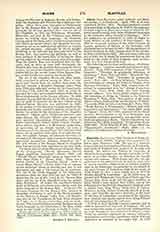

Glarean (Loam), HENRY, the most distinguished of Swiss humanists, poet, philosopher, geographer, mathematician, and musician, was born at Mollis, near Glarus, Switzerland, in June, 1488, and died at Freiburg-im-Breisgau, March 27, 1563. Loriti, or Glarean, as he came to be called after 1511, from the name of the town near which he was born, received his first instruction (as did Oswald Myconius, Rudolf Agricola, and others) from Michael Rubellus, at Rottweil. Rubellus also paid special attention to the development of his pupil’s musical talent. In 1566 Glarean entered the University of Cologne, where he devoted himself to philosophical and theological studies, and learned music and mathematics from Cochleus, and Greek from Caesarius. In 1510 he became a Licentiate and Master of Arts. In 1512 Maximilian I showed his appreciation of a poem which Glarean composed in his honor by raising its author to the dignity of poet laureate. In 1514 the University of Basle received him among its Magistri and licensed him to conduct a bursa, or students’ hall. Among his pupils was 2Egidius Tschudi, who was afterwards to become famous as an historian of Switzerland and as a zealous defender of Catholicism in the Canton of Glarus.
While at Basle Glarean formed a strong attachment for Erasmus, who in turn, acting as parens et preemptor, remained to the last a devoted friend and no doubt influenced his attitude in the midst of religious agitation and troubles. Glarean carried a recommendation from him when he started for Paris in 1517; here, too, he gathered pupils around him in a bursa and entered into close scientific intercourse with Budaeus, Faber Stapulensis, and Faustus Andrelinus. On the death of the last-named, Glarean became the recipient of a royal allowance, although he received no mandate to lecture publicly. In 1522 he settled at Basle, where he had a large following; but the continued advance of the religious movement which he, as an admirer of Luthers writings and an intimate friend of Zwingli, Myconius, and Oecolompadius, had originally sympathized with, gave him little satisfaction. He severed his relations with the partisans of the Reformation, and in 1529 emigrated with Ber, Amerbach, and Erasmus, to Freiburg-im-Breisgau. He labored in this university until his death, and was one of its most celebrated professors.
Glarean was the author of numerous and important works. In the course of his public and private teaching he produced a multitude of editions of, and commentaries on, ancient writers, among whom were Livy, Dionysius of Halicarnassus, Horace, Ovid, Donatus, Caesar, Sallust, Terence, Boethius, Lucan, Valerius Maximus, Eutropius, and Curtius. He made distinguished contributions to his favorite sciences, music and geography. He published at Basle, in 1547, his “Dodekachordon”, which was based on twenty years’ study of ancient and ecclesiastical music, and introduced twelve tones, instead of the eight only which had been known until then. The “Dodekachordon” was recently published in the sixteenth volume of the “Publikation alterer praktischer and theoretischer Musikwerke” (Leipzig, 1888-90). The standing of Glarean as a geographer rests on his “Helvetiae Descriptio”, a verse composition (Basle, 1515; also reedited by Bernoulli in 1890), one of the earliest and most widely read descriptions of Switzerland; also on his “Liber de Geographic unus” (Basle, 1527), which is an exhaustive and specific study, in forty chapters, of the principles of mathematical geography. A find of historical interest was a manuscript map of the world, dated 1510, in which he, like Waldseemuller, used for the newly discovered continent the name of “Terra America“. The library of Glarean eventually passed, through his friend, Bishop S.E. von Knoringen, to the University of Ingolstadt, and is now at Munich.
OTTO HARTIG

